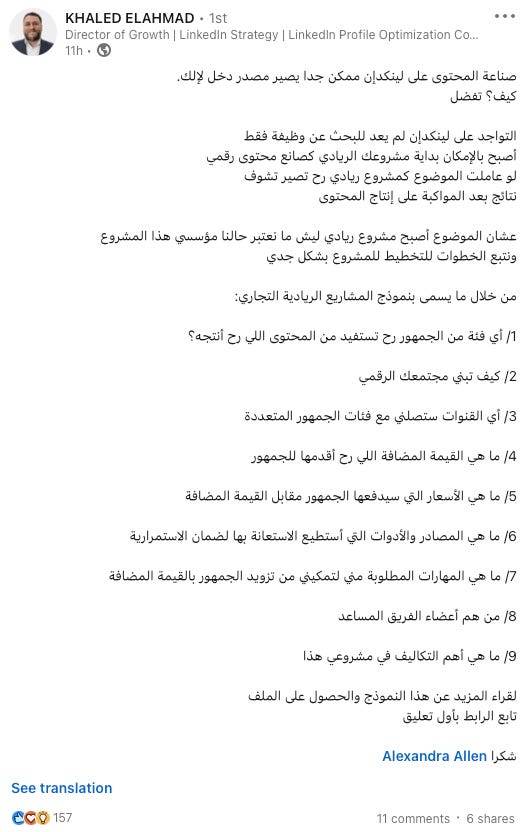34th edition: How to make money as a creator (by acting like a startup founder)
Thanks for being here
Hey everyone, hope you’re having a wonderful week
There’s a house where I grew up that looks like any other house—but it’s not.
Remember when the Spy Kids franchise exploded? Or Avatar?
That indistinguishable house is where the “movie magic” happened. It’s home to one of the best visual effects studios in the world.
Most people outside of the industry have no clue about the studio—let alone that Quebec is the top place in the world for visual effects and gaming. Hell, I didn’t even know until I joined Ubisoft—and I was born here.
There’s something unique about the way creativity and tech bleed together in Quebec. The arts—and by extension, creative businesses—flourish here. Part of it is due to cultural protection laws I mentioned in November, but the source of it is the mashup of French and English cultures.
As one of few Quebecers who’s lived in both mother countries, I’ve started to reflect more on how each culture plays into our own.
Stay tuned for more insights in response to prompts like this:
P.S. You can read the post David’s referring to in last week’s newsletter.
Now, down to business. Today I have one killer tip for you (on how to make money as a creator).
🎨 How to make money as a creator (by acting like a startup founder)
You can work hard as a creator and make no money. And it's easy to get trapped in a vicious cycle, thinking you'll finally start making money if you take one more course, join one more community—the list goes on. But you can make money now (by acting like a startup founder).
For those of you who don’t know, I worked at a Montreal startup incubator, called District 3, designing and delivering programs. The most valuable thing I learned from working with startup coaches? How to find a repeatable and scalable business model.
Now, whether you’re a course creator, writer—you name it, your goal (assuming you want to pursue your craft full time), is to find a business model.
Here are 5 steps to do that:
1. Think of your creator career like a startup
"A startup is a temporary organization designed to search for a repeatable and scalable business model."
Being a creator is similar. You need to figure out how to make money longterm. That starts with looking at the big picture.
2. Use the Business Model Canvas (BMC)
The BMC (pictured below) is a 1-page template detailing the 9 components that make up a business. Startup founders use it to be strategic about finding a business model. The BMC helps them organize their thinking and develop an action plan.
It can do the same for you.
3. Customize the BMC (as a creator)
Start by adding hypotheses to each component of your BMC. Go in the numbered order. But note numbers 1 and 2 are interchangeable (ex. You might want to serve customer segment X, or provide Y service).
Start with which ever makes sense, and then resume the order.
Here's my example:
4. Validate your hypotheses
Startup founders use customer discovery interviews to validate their hypotheses. They collect facts and update their BMC as they go (by validating or changing their hypotheses).
It takes 100 quality interviews to validate a business model.
5. Discover your repeatable and scalable business model
As a creator, you can do customer discovery work through content creation and short feedback loops. But you also need to do interviews. Otherwise, you miss out on critical qualitative data.
Don't believe me?
Here's the best example: Why do you think Write of Passage has arguably the highest referral rate of any course? Because 3 years in, David Perell and his team still do 1:1 interviews (on top of surveys).
That's how you find repeatable and scalable business models.
TLDR: You can make money as a creator by acting like a startup founder:
• Think of your creator career like a startup: your goal is to find a scalable business model.
• Use the Business Model Canvas to validate your business model through interviews.
• For a crash course on the BMC, check out Steve Blank's How to Build a Startup video course on Udacity.
LINKS: Here’s an article version of these tips and my BMC template for creators.
🔥 Bonus update
This morning, I woke up to an epic writing milestone. A LinkedIn connection translated the article above into Arabic and shared it with his network.
If that wasn't cool enough:
157 people have reacted
30 people have requested to connect
I'm mind blown—and touched.
Also, how gorgeous is Arabic script? Pure art.
شكرا لك (thank you, Khaled)
The takeaway? Share your ideas online. You never know who you’ll inspire.
Ironically, the Arabic version of my article is getting far more engagement than my English one. I love it.
Thanks for being one of the 158 people sharing this journey with me. Hit reply if you have suggestions for future editions, or feel free to just say hi.
Have a wonder-full week,






